I decided to test RHEL 5.1 to check what changed since RHEL 4. As I usually do a network installation, I had a few surprises.
The installation was done with qemu (with kqemu module) on an AMD Athlon(tm) XP 1800+ processor. The virtual ram was set to 256MB. The installation was done an an LVM LV, and took 25 minutes (pretty good I believe).
I tried to do a minimal installation, so I deselected all the available packages from the list. I ended up with 366 rpms and 935 MB on the disk (excluding /boot).
Look back in the anaconda-ks.cfg seems like that not the minimal installation as this is the %packages section:
%packages
@dialup
@core
@base
@java
device-mapper-multipath
-sysreport
I couldn’t find on the CDs a file to explain each of the groups here. The manuals talk about comps.xml for this info, but there is no such file on the 5 CDs. Such files are available for the extra software on the CDs like the cluster / virtualization software.
I also was surprised to see that I needed 3 CDs for the minimal installation. Although cd #2 was needed only for:
- libgcj
- java-1.4.2-gcj-compat
- gjdoc
- jpackage-utils
and cd #3 only for:
- wvdial
- isdn4k
- minicom
- lrzsz
- libwvstreams
- antlr
I guess these could easily be moved to the first CD and save people the CD changes which wastes time while babysitting the installation instead of doing it completely unattended. Also, seems like by removed the @dialup and @java groups we can be satisfied with only the #1 CD.
This also brought to my attention the method red hat choose on which CD each RPM will be placed. I’m sure doing a popularity contest like Debian is hard for a commercial distribution, but still knowing the method behind the CDs will be useful.
Generaly speaking, the installation went fine. I can start testing the system itself. about testing the


